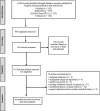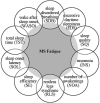Sleep disturbance and fatigue in multiple sclerosis: A systematic review and meta-analysis
- PMID: 37641617
- PMCID: PMC10460472
- DOI: 10.1177/20552173231194352
Sleep disturbance and fatigue in multiple sclerosis: A systematic review and meta-analysis
Abstract
Sleep disturbance is common in people with multiple sclerosis and may worsen fatigue; however, the assessment of sleep-fatigue relationships varies across studies. To better understand sleep-fatigue relationships in this population, we conducted a systematic review and random effects meta-analyses for the associations between fatigue and 10 sleep variables: Sleep-disordered breathing, daytime sleepiness, sleep quality, insomnia, restless legs, number of awakenings, sleep efficiency, sleep latency, sleep duration, and wake after sleep onset. Of the 1062 studies screened, 46 met inclusion criteria and provided sufficient data for calculating Hedges' g. Study quality was assessed using the Newcastle-Ottawa Scale. Sample characteristics did not differ between the 10 analyses. Results indicated that sleep quality and insomnia (assessed via self-report or diagnostic criteria) were strongly associated with fatigue (all gs ≥ 0.80 and all ps < .001). In contrast, the number of awakenings and sleep duration (assessed objectively) were not significantly associated with fatigue. Remaining sleep variables yielded moderate, significant effects. Most effects did not vary based on study quality or sample demographics. Results highlight that insomnia and perceptions of poor sleep have a stronger link than objective sleep duration to fatigue in multiple sclerosis and may represent a more effective target for intervention.
Keywords: (Medical subject headings): sleep initiation and maintenance; arousal; fatigue; multiple sclerosis; sleep apnea syndromes; sleep latency; sleep-wake disorders.
© The Author(s), 2023.
Conflict of interest statement
The authors declared no potential conflicts of interest with respect to the research, authorship, and/or publication of this article.
Figures



References
-
- National Multiple Sclerosis Society (NMSS). What is multiple sclerosis? 2016. https://www.nationalmssociety.org/NationalMSSociety/media/MSNationalFile....
-
- Hare CJ, Crangle CJ, Carney CEet al. et al. Insomnia symptoms, subjective appraisals, and fatigue: a multiple mediation model. Behav Sleep Med 2019; 17: 269–280. - PubMed
-
- Amtmann D, Bamer AM, Kim Jet al. et al. People with multiple sclerosis report significantly worse symptoms and health related quality of life than the US general population as measured by PROMIS and NeuroQoL outcome measures. Disabil Health J 2018; 11: 99–107. - PubMed
-
- Merlino G, Fratticci L, Lenchig C, et al. Prevalence of ‘poor sleep’ among patients with multiple sclerosis: An independent predictor of mental and physical status. Sleep Med 2009; 10: 26–34. - PubMed
-
- Freal JE, Kraft GH, Coryell JK. Symptomatic fatigue in multiple sclerosis. Arch Phys Med Rehabil 1984; 65: 135–138. - PubMed
Publication types
LinkOut - more resources
Full Text Sources
Miscellaneous

